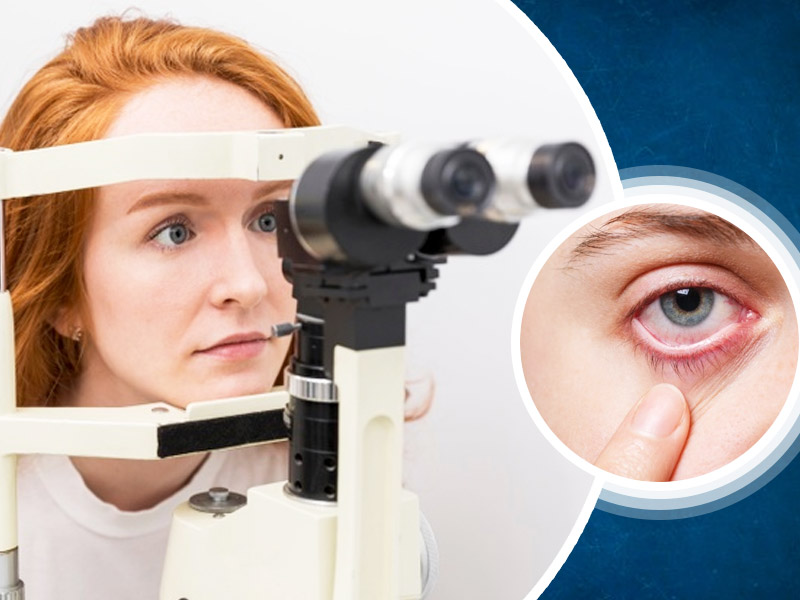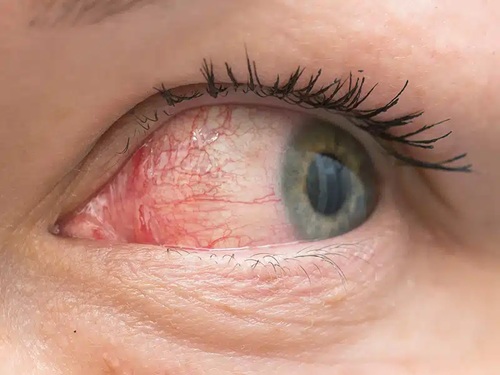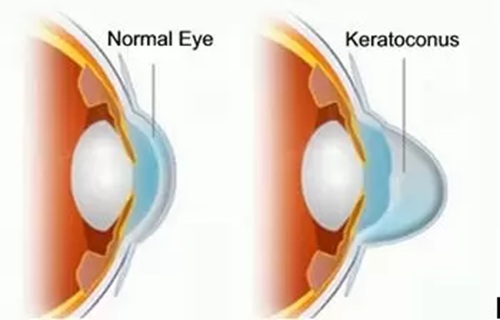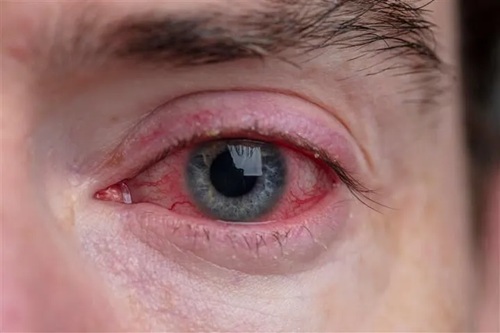Common Eye Diseases Treatment in Navi Mumbai
At Laxmi Eye Institute, Internationally recognized eye hospital in Navi Mumbai, centres at Panvel, Kharghar, Kamothe and Dombivali.

Understanding Common Corneal Conditions: Symptoms and Effective Treatments
The cornea plays a vital role in vision, and even minor issues can impact daily life. Explore this quick guide to recognize common corneal problems and discover effective treatment options.
Common Corneal Eye Problems, Their Symptoms, and Treatments
| Type of Eye Problem | Symptoms | Treatment |
|---|---|---|
| Corneal Abrasion | Sharp pain, tearing, redness, sensitivity to light, foreign body sensation | Lubricating eye drops, antibiotic eye drops to prevent infection, temporary eye patch |
| Keratoconus | Blurred or distorted vision, increased light sensitivity, frequent prescription changes | Custom soft or rigid gas permeable contact lenses, corneal cross-linking, corneal transplant in advanced cases |
| Corneal Ulcer | Severe eye pain, redness, blurred vision, discharge, white spot on the cornea | Antibiotic/antifungal/antiviral eye drops (based on cause), pain management, surgical repair if needed |
| Fuchs' Dystrophy | Gradual vision decline, especially in the morning, glare, halos around lights | Hypertonic saline drops/ointment, corneal transplant (DSAEK or DMEK) in advanced stages |
| Dry Eye Syndrome | Gritty or burning sensation, eye fatigue, blurred vision, watery eyes | Artificial tears, prescription eye drops (like cyclosporine), punctal plugs, lifestyle changes |
| Corneal Edema | Blurry vision, seeing halos around lights, eye discomfort | Hypertonic saline solution, reducing intraocular pressure, surgical intervention (if chronic) |
| Pterygium (Surfer's Eye) | Visible growth on the eye, irritation, redness, dry eyes, visual distortion | Lubricating drops, anti-inflammatory drops, surgical removal for large or recurring growths |
| Herpes Simplex Keratitis | Eye redness, pain, watery eyes, light sensitivity, blurred vision | Antiviral eye drops or oral medications, avoiding steroid use unless prescribed |
| Corneal Neovascularization | Decreased vision, visible blood vessels on the cornea, irritation | Discontinuing contact lens use, anti-inflammatory eye drops, laser therapy or surgery |
| Contact Lens Overwear Syndrome | Eye redness, discomfort, blurry vision, sensitivity to light | Temporary discontinuation of contact lenses, lubricating drops, proper lens hygiene education |
CORNEAL ULCER TREATMENT IN NAVI MUMBAI

What is a Corneal ulcer?
A corneal ulcer is an infection of the cornea which is a transparent glass-like structure of the eye.
A corneal ulcer is caused by germs (microorganisms) which invade the inner layers of the cornea and destroy it.
A person of any age can get a corneal ulcer and it is potentially a blinding condition
What are the risk factors of Corneal ulcer?
Usually, injury to the eye is the most common cause which can lead to a corneal ulcer.
People who are contact lens users are also at a higher risk of getting a corneal ulcer
People with diabetes, dry eyes, repeated lid infections are at a high risk of developing and worsening of corneal ulcer
What are the symptoms of a Corneal ulcer?
Redness with sticky discharge may be the only symptom in the initial stages
People with corneal ulcers usually have pain and watering.
Decreased vision and difficulty in looking at light or bright objects
A white spot of infection may be visible on the black part of the eye along with other symptoms
Treatment of Corneal ulcer in Navi mumbai
The treatment of Corneal ulcer at CORNEA TREATMENT IN MUMBAI is administered by a Cornea Specialist who is an eye surgeon specializing in the diseases of the Cornea. The mainstay of treating a corneal ulcer at CORNEA TREATMENT IN MUMBAI is prescribing the correct medicine for a particular infecting germs or microbes instead of starting a mixed bag of medicines.
Cornea specialists at Laxmi Eye Hospital are trained in techniques of identifying these germs. The in house microbiology setup at Laxmi Eye Hospital, backed by the expertise of our Cornea Specialists ensures that these germs can be promptly identified and optimum treatment can be initiated without having to wait for an external laboratory report.
Advanced and complicated Corneal ulcers may require complex surgical procedures for their treatment. Cornea specialists at Laxmi Eye Hospital, are also trained and experienced in managing such difficult cases. We are well recognized for cornea treatment in Mumbai.
At Laxmi Eye Hospital we are committed to our aim of continued medical care. To facilitate this at CORNEA TREATMENT IN MUMBAI we employ a state of the art photo documentation system which helps in monitoring the progression or worsening of patients with Corneal ulcers.
DRY EYE TREATMENT IN NAVI MUMBAI

What is Dry Eye?
Dry Eyes is the catch-all term which refers to the abnormalities in the tear layer which normally coats the surface of the eye. A healthy tear layer is needed for clear vision and also to protect the sensitive tissue of the surface of the eye.
What causes dry eye?
The human tear film consists of an aqueous (watery) layer with a thin lipid (oily) layer on top to retard evaporation and a thin mucous (sticky) layer underneath to help it adhere properly to the surface of the eye. Disturbance of any one or more of the three layers interferes with the process of routine lubrication of the surface. These disruptions, if prolonged, may cause one of the conditions that classify to be called dry eye.
What are the conditions which can lead to dry eyes? Who are at risk to develop Dry eyes?
There are many different causes of the conditions collectively referred to as dry eye syndrome, which include; aging, menopause, prolonged computer use, environmental (dry climates, air conditioning, pollution, wind), auto-immune diseases (e.g. Sjögren's Syndrome, RHEUMATOID ARTHRITIS, LUPUS), surgeries on the eyes or eyelids (e.g. BLEPHAROPLASTY, LASIK, LASEK, PRK, corneal transplants, etc.) and medication side effects.
What are the symptoms of dry eyes?
Symptoms of dry eyes vary greatly. Some of the most common symptoms are:
Feeling like there is something in your eye (foreign body sensation)
Scratchy, gritty eyes, smarting or burning eyes
Watery eyes
Sensitivity to light
Eyes tire easily, particularly noticeable from reading, watching TV or using a computer
Contact lens discomfort or intolerance
Excessive mucus discharge
Eyes easily irritated by smoke, allergens, fragrances, etc.
Fluctuating vision
Blurred vision, particularly first thing in the morning, and/or late in the day
Eyelids "stick shut" at night
Eyelids feel "heavy"
How are Dry eyes diagnosed? Does it require complicated tests?
The diagnosis of dry eyes is a simple clinic-based procedure. Doctors at Laxmi Eye Hospital can easily perform minor tests in their clinics which take less than 10 minutes to do. Sometimes, the Cornea specialists at CORNEA TREATMENT IN MUMBAI may advise certain blood tests to determine the cause of dry eyes.
Is there a cure for dry eyes?
Though there is no permanent cure for dry eyes, it can be treated by one or more of the following ways:
By supplementing the deficient tears in the eyes with artificial tear drops prescribed by the doctors.
By preserving the natural tears produced by your eyes from draining into the nose and keeping them in contact with the eye for a longer time by using silicone plugs that block the draining ducts or using heat to permanently block these ducts.
By preventing excessive evaporation of the tears. This can be done by lifestyle modification and also by modifying the environment. Using wraparound glasses to prevent wind drying the eyes, using humidifiers at home in dry conditions, reducing the use of air conditioning can all help relieve dry eye symptoms.
Other treatments of dry eyes include supplementing the diet with omega 3 fatty acids which are found naturally in Oily fish and Flax seeds. Alternatively, prescription drops like Cyclosporine, or steroids are used to treat dry eye symptoms. However, these medicines should be used according to the doctor's instructions only.
Treatment of the general body disease also helps in controlling the dry eye symptoms.
EYE ALLERGIES TREATMENT IN NAVI MUMBAI
What is Eye allergy (allergic conjunctivitis)?
Eye allergy (allergic conjunctivitis) is an abnormal response of the conjunctiva (translucent membrane covering the white of the eye) to environmental irritants (known as Allergens) which lead to itching, redness, watering, and sticky rope-like discharge.
What are the Allergens?
The allergen could be any substance which you come in contact with. The most common ones are dust, pollen, mites, molds, and other particulate matter in the air that come in contact with your eyes. However, a person can be allergic to any other substance apart from those mentioned here. Though there are tests to determine a person's particular allergen it can never be exhaustive enough.
Who can get Eye Allergy?
Eye allergies can affect adults and children alike. The tendency to get eye allergies runs in families. People with Asthma, Allergic dermatitis or Contact dermatitis, recurrent cold and sinusitis are at a higher risk of getting allergic eye disease.
How can Eye Allergy be prevented?
The ideal thing to do would be to completely avoid exposure to the allergen. However, this is not possible most of the time. Hence, lifestyle modification by wearing large frame glasses, avoiding dry dusty, and windy situations, and keeping other allergic diseases under check will help to suppress manifestations in the eye.
What is the treatment of allergic eye disease?
Allergic eye disease can be controlled by a combination of lifestyle modifications and medicines.
Cold compresses with a soaked cloth or ice packs help to suppress the urge to itch.
Avoiding vigorous eye rubbing is of paramount importance, especially in children, to avoid changes in corneal shape and blurring of vision.
Eye drops are the mainstay of the treatment of eye allergies. Sometimes, eye drops have to be used all year long.
Rarely the doctors may prescribe tablets in severe cases.
In children, allergic conjunctivitis may gradually subside in the late teen ages and they can be taken off medication.
Doctors at Laxmi Eye Hospital have ample experience in treating allergic eye diseases in both adults and children.
KERATOCONUS TREATMENT IN NAVI MUMBAI

What is Keratoconus?
Keratoconus is an abnormality of the shape of the cornea in which the cornea progressively bulges forward and starts to thin out. This leads to change in the optical properties of the cornea and leads to blurring of vision.
Who can get Keratoconus?
Keratoconus has some genetic basis which means it can run in families and affect cousins too. Usually, these families have an inherent weakness in the corneal structure which can lead to abnormal bulging and thinning. However, people with absolutely no family history of Keratoconus can get affected too.
It is also associated with other conditions like-
Allergic diseases of the eyes
Hard Contact Lens wear
Retinitis Pigmentosa
Lebers Congenital Amaurosis
Downs Syndrome
Mitral Valve prolapse
Osteogenesis Imperfecta
What are the symptoms of Keratoconus?
The blurring of vision is the most common complaint of patients with Keratoconus. It may also be associated with frequent changes of your glass power. Apart from this Keratoconus may also lead to:
Distortion of images
Glare and haloes or rings around a light source
Loss of contrast especially in dim light
Rarely, patients with Keratoconus may have sudden onset pain and severe blurring of vision with a whitish appearance of the Cornea.
Can Keratoconus be prevented?
No. However, the progression of Keratoconus can be delayed by avoiding eye rubbing. Newer treatment modalities can also halt the progression of Keratoconus and arrest it at an initial stage.
How will the doctors know whether my disease is progressing?
Newer technology allows the Cornea specialist to get a perfect picture of the changes in the shape of the diseased cornea at CORNEA TREATMENT IN MUMBAI. This technology known as Corneal topography, which involves a quick scan of the cornea on specialized machines, allows the Cornea specialist to determine whether your disease is progressing. At Laxmi Eye Hospital we boast of having the most modern machine known as the Oculyser which can quickly get an accurate scan of your eye.
How can Keratoconus be treated?
The goal of Keratoconus treatment is to prevent progression and to take care of the blurring of vision. At Laxmi Eye Hospital a wide variety of treatment options can be availed. We are famous for cornea treatment in Mumbai.
Corneal Collagen Cross-Linking: This is a decade old procedure that can increase the strength of the corneal tissue and halt the progression of the disease. At Laxmi Eye Hospital, the Cornea specialists perform this simple procedure to halt the progression of the disease. It involves soaking the cornea in a special medicine followed by exposing it to a safe Ultraviolet light at CORNEA TREATMENT IN MUMBAI. At Laxmi Eye Hospital the patients can avail of this treatment with one of the state-of-the-art machines available.
Spectacles: In the initial stages of the disease spectacles alone may suffice to correct blurring of vision.
Contact Lenses: Contact lenses are an indispensable mode of treatment of Keratoconus. By sitting on the cornea and effectively nullifying the abnormalities of the corneal shape, Contact lenses provide a sharp image formation which is otherwise not possible with spectacles.
At Laxmi Eye Hospital we have a dedicated Contact Lens department with technicians and optometrists specially trained in the art and science of fitting advanced contact lenses. At CORNEA TREATMENT IN MUMBAI, this allows us to offer our patients a wide basket of Contact Lens options for Keratoconus which can suit their stage of disease and budget. We are well recognized for cornea treatment in Mumbai.
Corneal transplants: Very advanced stages of Keratoconus may require replacing the diseased cornea with a new one from a cornea donor in a procedure called Corneal Transplantation. Cornea specialists at Laxmi Eye Hospital are well versed with all the modern techniques of Corneal transplantation. Having a fully functioning Eye Bank at CORNEA TREATMENT IN MUMBAI ensures that a patient does not have to wait too long to receive a donor cornea.
At Laxmi Eye Hospital, we believe in tailoring the treatment to our patients' needs. We strive to offer the most effective, ethical, and economical treatment to our patients. We are well recognized for cornea treatment in Mumbai.
DISEASES OF THE OCULAR SURFACE

What is the Ocular Surface?
The Ocular Surface is that portion of the eye which is in direct contact with the external environment. This mainly involves the tear film, the Cornea, and the Conjunctiva (thin, translucent membrane covering the white part of the eye). However, the Eyelids and Tear glands can also be included in the ocular surface as there is constant interaction between all these structures. Maintaining a healthy ocular surface is supremely important to maintain the flawless transparency of the Cornea, and by extension for clear vision.
Which diseases can affect the Ocular surface?
Many diseases can affect the Ocular surface. They can be as innocuous as mild Dry eye or as complex as severe Chemical Burns of the eye or scarring due to Stevens-Johnson syndrome or Ocular Cicatricial Pemphigoid. Cornea specialists at Laxmi Eye Hospital are trained under world-renowned scientists and clinicians in the art and science of treating both acute and long term effects of these diseases.
What are the symptoms of Ocular Surface diseases?
Ocular Surface diseases can present with many different symptoms. In the initial stages, they can be
Dryness of the eye with a constant redness and irritation
Persistent pain.
The blurring of vision or fluctuating vision
Increased sensitivity to bright and later ambient light
The progressive whitish appearance of the cornea.
In advanced stages, the patient can suffer from
Inability to open eye
Thick fleshy mass growing from lid to cornea leading to poor eyesight
The cornea or the eye-getting hidden completely
At Laxmi Eye Hospital, a detailed examination of all such conditions is carried out in the Cornea department and a detailed treatment plan is formulated. We have the best equipment for cornea treatment in Mumbai.
What are the treatment options available for Ocular Surface diseases?
Depending upon the stage and severity of the disease, Ocular surface conditions may be treated at CORNEA TREATMENT IN MUMBAI as follows,
Medically with eye drops and oral medications
Advanced Contact Lenses
Human Amniotic Membrane transplantation
Conjunctival autograft
Ocular surface reconstruction
Stem Cell Transplantation from the patient's other healthy eye or living relative or a non-related donor
Lid margin and Ocular surface Mucous Membrane Grafts.
Keratoprosthesis (Artificial Cornea Transplantation)
At Laxmi Eye Hospital, these advanced treatments may be availed under the same roof.
Make An Appointment
All Copyright© Reserved @ Laxmi Eye Hospital And Institute
